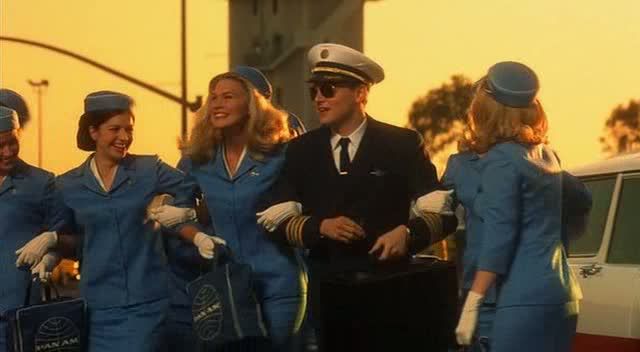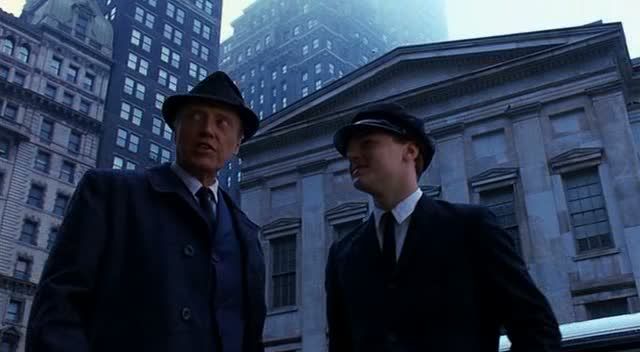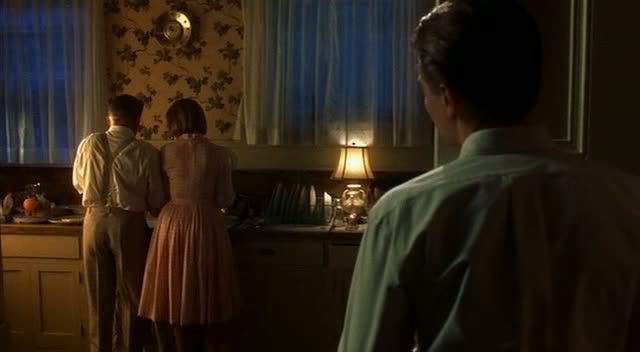
Steven Spielberg's Catch Me If You Can is a breezy but smart thriller, a briskly paced film whose playful title captures the charm and ease of this story, but barely hints at the surprising emotional nuances that Spielberg finds in this 1960s con man who skipped across America inventing occupations and identities for himself. It's based on the true story of Frank Abagnale Jr. (Leonardo DiCaprio), who runs away from home at the age of seventeen and immediately begins concocting grand schemes that are as much about creating a glamorous identity for himself as about all the money he makes through counterfeit check schemes. For Spielberg, Abagnale is still a kid when he runs away, trying to recapture an idealized image of happiness and family and security that he lost in his teenage years. The film opens with some unnecessary framing material set after Abagnale's eventual capture, but it doesn't really start until the scenes of the Abagnale family's 1960s suburban bliss.
Frank's father (Christopher Walken) is an honored man in their community, a local businessman who's recognized by his peers and respected by all. Frank Sr. is, above all, proud of his wife, Paula (Nathalie Baye), who he met during World War II in France. Frank Sr. tells the story of how he met her over and over again, how he saw this gorgeous blonde dancing in a small village and vowed that he "wouldn't leave France without her." As he tells the story over Christmas, dancing with his wife as Frank looks on, Frank knows all the words by heart, can fill in the blanks with ease. It's a story he cherishes, because it contains the essence of Frank Sr.'s philosophy, an ideology of entitlement that he passes on to his son: if you want something badly enough, if you fight hard enough for it, you will get it. Of course, the Abagnales' happy life eventually falls apart as Frank's father gets in trouble with the IRS and spirals into ruin and disgrace. His wife begins bringing other men around, and Frank knows that trouble is coming, but he still isn't prepared for the announcement that his parents are getting divorced. Unable to deal with it, he simply runs away.

Those early scenes, bright and idyllic as they are, are like TV sitcom visions of domestic contentment: the glamorous mother and suave father, an icon of paternal serenity even as his life collapses around him. Frank carries these visions off into the world, memories of the paradise he's lost and is now trying to recover. He is an intuitive mimic, and he is seeking alternate realizations of the glossy glamor of his childhood. He sees a pilot, in his crisp black uniform, surrounded by beautiful, cheery stewardesses in pale blue, and he immediately seizes upon this image as his own goal. Other kids would want to learn how to fly, to go through the work, to achieve that ambition, but not Frank. He doesn't want to fly, he just wants to be a pilot, and to him the two are almost unconnected. It's not the job he wants, it's the image of himself in that handsome uniform, surrounded by pretty, giggling girls. It's the sensation of walking down the street, turning heads wherever he goes. The film is set in an era when flight still seemed a little magical, and certainly very adventurous: the pilot is a kind of globetrotting hero, in control of these giant metal birds that only he really understands how to handle, living a life of adventure all around the world. When Frank occasionally reports in to his father with his adventures, his father is impressed by how "exotic" his son's life is. He says the word repeatedly, with a kind of reverent awe: where are you going tonight, Frank, he asks, somewhere exotic? Frank is able to continue and even improve upon the life of glamor and respect that his father lost when his finances fell apart.
Frank's opposite number is the FBI agent Hanratty (Tom Hanks), who makes it his mission to catch Frank as the con man's tricks grow bolder and bolder. Frank and Hanratty share a Christmas tradition, a telephone call from the lonely man on the road to the lonely man in the office. Both have nothing better to do on a family holiday. Both have shattered families. Hanratty still wears his wedding ring, as Frank points out, but he's not lying when he says he doesn't have a family; the air of sadness of a man with nothing waiting for him outside the office is unmistakable. The film is nakedly about the desire for family; it's not even a subtext, it's what drives everything Frank does, everything he wants. He doesn't even care about the money, not really. At one point, he pulls out a pair of suitcases that are stuffed with loose bills, carelessly tossed inside and crumpled up. Frank projects such a calm, self-assured demeanor most of the time that it's easy to forget, even for the audience, what an insecure child he still really is, but moments like that make it clear. He's got suitcases full of money that he doesn't know what to do with, and still he keeps going, keeps writing bad checks, keeps making up new identities: a doctor, a lawyer, a Harvard graduate, a Berkeley graduate. It's not about wealth for him, but what the wealth stands for: respect, security, acceptance, being able to impress people. He's after the vibe of that Rotary Club dinner — the first scene of the film after the framing material — where his father is honored by his town's most respected men, even the mayor himself.
Frank thinks he's found this restoration of family life in Brenda Strong (Amy Adams), a young nurse who he meets in a hospital, and who spontaneously inspires in him yet another lie, yet another identity: as a doctor. This, more than anything else Frank does, makes it clear that it's not money he wants. There's no money in this ploy, not really, but there's the respect of being in a noble profession, and there's the obvious adoration of Brenda, who's the same age as Frank, more or less, but seems like a giggly teen in comparison to his assured maturity, which makes him believable when he says he's a decade older than he actually is. (The casting of DiCaprio is ingenious in this respect: he looks awkward and ungainly as a teen in the early scenes, then seems to naturally grow into Frank's cocky-kid projections of maturity and confidence.)

Frank rediscovers, with Brenda and her family, the happy home life he'd lost as a child. They are almost surreal, this cheery, tight-knit family, and it's easy to forget the darkness lurking just around the corner: Brenda's Irish Catholic parents had kicked her out after she'd slept with a boy and gotten an abortion. Frank's seeming respectability wins them back over, not only to him, but to their own daughter. They're living a different kind of lie from Frank, lying to themselves about their own goodness, rejecting their daughter as a slut until she returns with a handsome doctor who wants to marry her. Spielberg kind of glosses over this subtext, but it's there nonetheless, lurking beneath the unreal cheeriness and familial closeness of this household. In a David Lynch film, the Strongs would be a parody of suburban nicety and inner hypocrisy, but one senses that Spielberg sees them in more of a rosy light. They're funny, this stern but sentimental couple who do the dishes together, their butts swaying in time to the music, dancing together as they do domestic chores, totally in sync and totally contented. Frank watches them and sees in them his own parents, dancing together in the living room on Christmas, totally happy and totally into each other.
It's a dream of family, an ideal, and Spielberg's cinema is perfectly suited to capturing ideals. This is such a rich film because Spielberg seems to identify so completely with Frank the innocent trickster, always in search of family, always in search of a childhood innocence that's gone forever. Everything in the film is seen through this lens. Everything is 1960s glossy, bright and airy, clean and pure. Only occasionally does Frank touch up against the grimier underpinnings of the fantasy life he's building for himself: a glimpse of a bloody leg during his doctor ruse, a negotiation with a prostitute that's a letdown after he thought he was having just another romantic encounter, the tears of Brenda when she tells him about her abortion and again when he has to leave her, to go on the run again. These are reminders that the fantasy is just a fantasy, that the glossy world Frank is erecting around him can only remain intact so long as he keeps his blinders on to everything he's running from, everything that's poised to destroy his dreams. Spielberg brilliantly constructs that glossy fantasy world, a con boy's dream of love and family, and he brilliantly explores the emotions of the man running through the fantasy, breathlessly exclaiming "catch me if you can" as though it's all a game, even if it's really anything but.

12 comments:
A very light-on-its-feet Spielberg entry built entirely around Leonardo's naughty-boy charm. It works quite well. As a matter of fact I think Spielberg understands leo's extents and limitations fat better than Marty does.
Yeah, DiCaprio is really good in this, his boyish charm and vulnerability go a long way towards making this film work so well. He certainly comes off a lot better here than he does in more deadly serious material like Shutter Island or Inception, because this movie really is playing to his innate strengths in ways the others don't.
"This is such a rich film because Spielberg seems to identify so completely with Frank the innocent trickster, always in search of family, always in search of a childhood innocence that's gone forever. Everything in the film is seen through this lens. Everything is 1960s glossy, bright and airy, clean and pure."
Absolutely Ed! This supremely entertaining film, briskly paced and exilarating boasts an authentic period feel, an eclectic array of actors and some inventive storytelling. It's a witty caper film, which is both smart and funny, and it showcases a marvelous saxophone-flavored score by John Williams that captures the wreckless merriment inherent in the film's narrative arc. (It's one of the veteran composer's finest scores in fact) Rather than recalling the drug and political turbulence of the 60's Spielberg and his screenwriter Jeff Nathenson focus on the more frivilous context of the time, like James Bond movies. Of Spielberg's most mature films, this is perhaps the purest and most unpretentious. Di Caprio really came of age with this performance. Terrific review as usual.
Yes, I would also chime in here about how good DiCaprio is in this film. Christopher Walken is also incredible and it was nice to see him finally in a challenging role after years of puttering around in forgettable films. The scene where he has dinner with DiCaprio and breaks down and tries to recover is incredible and really shows what he's capable of. I had hoped that based off his work on CATCH ME that he would've got more mainstream work but that hasn't seemed to be the case.
Oh yeah, and the opening credits sequence for this film has to be one of my faves of all time. It really sets the tone and establishes the mood of the film perfectly.
Sam, good point about how Spielberg ignores the usual radicalism/drugs portrait of the 60s in favor of a more rosy view of the era that's derived, at least in part, from movies and TV.
J.D., Walken was definitely great in this. The scenes with him are heartbreaking because Frank is all but begging his father to be his moral compass, and instead Frank Sr. just sees Frank's cons, his "exotic" lifestyle, as a way of sticking it to the mainstream society that let Frank Sr. fall from grace. Walken is very moving in those scenes, totally failing to help his son because he's still nursing his own wounds.
And the title sequence is fantastic. Very Saul Bass.
That's because Spielberg was never involved in either radicalism or drugs. He's the world's hippest square.
Hah, very true. I always mentally associate Spielberg with Forrest Gump, in part because I assume that's pretty much what his portrait of 60s radicalism would look like.
Nicely done Ed.
This film has aged beautifully and I think as time goes by it's going to be seen more and more as Spielberg's masterpiece of the Aughts (probably tied with Munich).
Beneath the candy coating I've always thought it's Spielberg's most melancholy film. The shot of the dollar slipping under the door and blowing past Tom Hanks, is one of the most wistful in Spielberg's career.
Not as melancholy as A.I.!
Thanks, Bryce. Glad you mentioned the shot with the dollar, that was nice. That whole sequence was really melancholy, starting with the realization that though Frank is raking in all this money with his scams, he's still basically an overgrown kid who has no idea what to do with it all other than stuff it into suitcases. It's a moment of real piercing insight.
It's hard to believe Catch Me if You Can will be marking its 10th Anniversary come next year. Has it been that long already? I still remember seeing the film as if it were yesterday. It's a great movie--maybe not a masterpiece like A.I., Minority Report or Munich, but nevertheless one of Spielberg's warmest human dramas. It's even something of a cousin to The Sugarland Express as one of Spielberg's few movies taking the perspective of the criminals themselves.
DiCaprio is fantastic here, too, although I disagree with David that he's better here than he is in Scorsese's films--particularly Shutter Island. I might go so far as to say that DiCaprio's work in that movie was last year's best male performance... but that's straying off-topic. Christopher Walken is an even bigger surprise in Catch Me if You Can; it was his best performance in years, and the Oscar-nomination he got for it was well-deserved.
Yeah, it doesn't feel that old, Adam - though it sometimes makes me feel old to realize that movies that feel like they came out yesterday are actually a decade old or more.
Walken is great in this, proving once again that he's too great an actor to get typecast in the quirky weirdo nothing parts he gets stuck with way too often these days.
Post a Comment